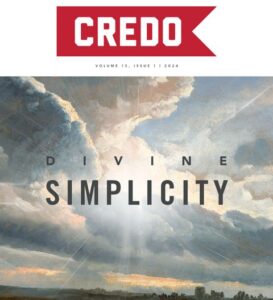
The New Issue of Credo Magazine is Here! Divine Simplicity
As goes divine simplicity, so goes classical theism.
For some theologians, the affirmation of divine simplicity proves too much to bear, and the denial of such a doctrine requires them to dismiss classical theism as a whole.
For many others, however, it was the discovery of divine simplicity that set them on their way to embracing the classical doctrine of God in all of its beauty. The doctrine of divine simplicity teaches that God is not made up of parts and that all that is in God is God. God is not merely good but is goodness itself; God is not only loving but is love. On this truth hangs many classical doctrines – immutability, impassibility, and even Nicene trinitarianism. Readers of this issue of Credo Magazine will find, ironically, that the “whole” of Christian doctrine is very much dependent upon this one “part.” It is no wonder that divine simplicity has been held by Protestants of all denominations and is ubiquitous throughout the Reformed confessions. To confess divine simplicity was nothing less than an alliance with the orthodox doctrine of God handed on by the Great Tradition. Take up, read, and confess with ancient Israel and the Church as a whole that the Lord our God is one!
With articles by Adonis Vidu, Lance English, J.T. English, James, Dolezal, Keith Mathison, Jake Rainwater, Rudi Te Velde, Brett Fredenberg and many, many more! Check out the latest issue here.


